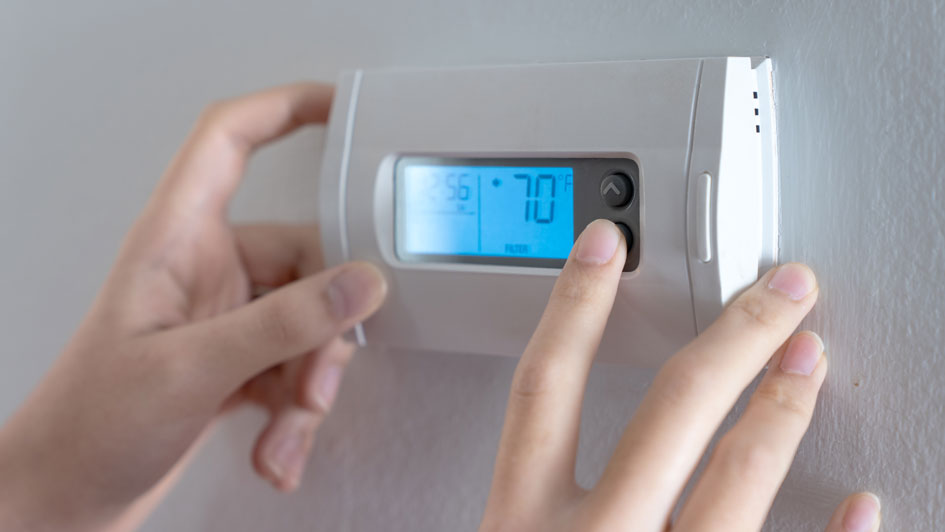
It's always nice when we manage to save money on our utility bills, but it just so happens there’s a way to keep costs down, even when you're out of the house.
The key is your thermostat. By making the most out of your thermostat, you can help the thermostat plan for your preferred temperatures. That means you can have different temperature settings for when you’re at home, away or even when you’re sleeping.
With a few simple adjustments, you have more time to enjoy pleasant temperatures while also keeping more of your money. Take a look at a few ways your thermostat can save you money in the summer:
While at Home
When you’re home, you want a nice range of pleasant temperatures. For the most part, you probably have your thermostat lower in the summer while you are in the house to make the most of the cool air.
But the ideal temperature for when you're in your home during the summer is actually around 78 and 80 degrees Fahrenheit. This way, you'll avoid the worst of summer while keeping your energy bill more manageable.
While Out of the House
When setting the temperature for a vacation or other trip away from the house, it’s advantageous to set the thermostat higher than normal.
Depending on the local climate or your home's location, you can set the thermostat to higher temperatures like 88 degrees while no one is home before lowering it back to the sweet spot of 78-80 degrees once you're home again. This way, your air conditioning won't have to work constantly to provide cooling for a bunch of empty rooms.
While Sleeping
When it comes to sleeping in the summer, you want a temperature that's nice and cool. A great place to start is between 68-72 degrees Fahrenheit. There's less risk of getting too hot or too cold while you're trying to sleep.
Other Ways to Use Less Energy:
- Put in a smart thermostat: Using a smart thermostat in the summer can lower energy costs as it forms temperature schedules according to your lifestyle and personal preferences. They can lower the temperature while you are home or sleeping, before allowing it to get a little warmer when no one is around. With models like the Lennox iComfort, you are able to adjust settings and schedules through your smartphone, tablet or laptop. Planning smart thermostat installation in your West Valley City home can be the simplest strategy for maintaining comfortable, yet energy-efficient temperatures whether you're at home or across the country.
- Upgrade your HVAC system: Upgrading your HVAC system can save money in the long run. With greater energy efficiency, you can also count on lower utility bills since more efficient equipment requires less energy to heat and cool your home. Air conditioning installation in West Valley City is a great way to beat the heat in the summer.
- Stay on top of routine AC maintenance: Whether or not you keep up with regular air conditioning maintenance in West Valley City can have a serious effect on your total monthly energy use. With regular cleaning of the coils, checking for damage and keeping vents clear of dust and debris, this can help your HVAC system run more efficiently. Increasing efficiency also limits strain on important or delicate components and lowers operational costs, lowering total energy use and eventually the total monthly bill.
- Clean or replace the air filter on a regular basis: A regular schedule for cleaning or replacing the HVAC system's air filter saves money by helping air flow efficiently through your air conditioner. When filters are old and less effective, air conditioners have to work harder, and the strain can reduce the system’s life span and lead to breakdowns.
- Check if you have enough insulation in the attic: Insulation is a vital part of maintaining an energy-efficient home, securing the hot air outside and the cool air inside during the summer. The North American Insulation Manufacturers Association (NAIMA) recommends that homes in the southern United States should have at least 13-14 inches of insulation, while colder climates do better with 16-18 inches.
- Check your ventilation: Leaky ductwork can raise your energy bills much more than 20 percent, plus it can affect equipment such as your water heater, clothes dryer and other appliances throughout your home. Finding any leaks fast and sealing them can help with both these issues.
- Seal all other leaky spots in your home: Sealing up other leaks in your home with caulk, foam sealant or weather-stripping can help keep it cooler on hot summer days. You should also check for any gaps around windows, doors and even outdoor fixtures. Making time to seal leaks now can help you save a lot over time.

